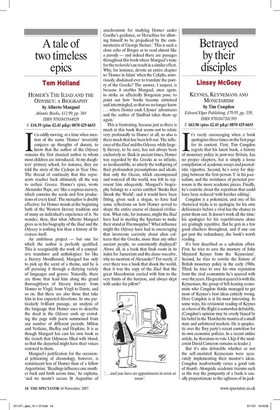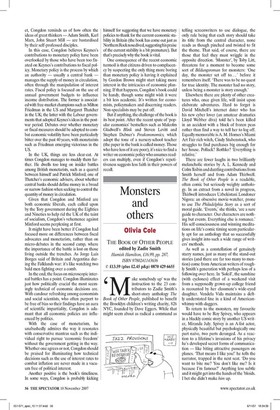Betrayed by their disciples
Linsey McGoey KEYNES, KEYNESIANS AND MONETARISM by Tim Congdon Edward Elgar Publishing, £79.95, pp. 339, ISBN 9781847201393 © £63.96 (plus £2.45 p&p) 0870 429 6655 1 t's rarely encouraging when a book apologises three times on the first page for its content. First, Tim Congdon regrets that his latest book, a history of monetary policy in post-war Britain, has no proper chapters, but is simply a loose compilation of academic essays and journalistic vignettes. Second, he's sorry for skipping between the first-person 'I' in his journalism, and the avoidance of personal pronouns in the more academic pieces. Finally, he's contrite about the repetition that could have been reduced 'with harsher editing'.
Congdon is a polemicist, and one of his rhetorical tricks is to apologise for his own deficiencies before a rival has the chance to point them out. It doesn't work all the time: his apologies for his repetitiveness alone are gratingly repetitive. But he gets in a few good clinchers throughout, and if one can get past the redundancy, the book's worth reading.
It's best described as a salvation effort. First, he tries to save the memory of John Maynard Keynes from the `Keynesians'. Second, he tries to rewrite the history of British monetary policy in the early 1980s. Third, he tries to save his own reputation from the rival economists he's sparred with over the years. His greatest quarrel is with the Keynesians, the group of left-leaning economists who Congdon thinks managed to get most of Keynes's best ideas entirely wrong. Here Congdon is at his most interesting. In some ways, his revisionist reading of Keynes as a hero of the Right is somewhat debatable. (Congdon's opinion may be overly biased by his belief in the Thatcherite mantra of a small state and unfettered markets. He is apoplectic over the Tory party's recent contrition for its own economic policies. In a recent online article, he threatens to vote Ukip if the modernist David Cameron remains as leader.) But it's also debatable whether or not the self-anointed Keynesians were accurately implementing their mentor's ideas. Congdon inadvertently raises a good rule of thumb. Alongside academic truisms such as the way the pomposity of a book is usually proportionate to the ugliness of its jacket, Congdon reminds us of how often the ideas of great thinkers — Adam Smith, Karl Marx, John Stuart Mill — are bastardised by their self-professed disciples.
In this case, Congdon believes Keynes's contributions to monetary policy have been overlooked by those who have been too fixated on Keynes's contributions to fiscal policy. Monetary policy is the process by which an authority — usually a central bank — manages the supply of money in circulation, often through the manipulation of interest rates. Fiscal policy is focused on the use of annual government budgets to influence income distribution. The former is associated with free-market champions such as Milton Friedman in the US and Margaret Thatcher in the UK; the latter with the Labour governments that adopted Keynes's ideas in the postwar period. Debates over whether monetary or fiscal measures should be adopted to combat economic volatility have been particularly bitter over the past 40 years, with monetarists such as Friedman emerging victorious in the US.
In the UK, things are less clear-cut. At times Congdon manages to muddy them further. He dwells too long on insider battles among British monetarists, such as a quarrel between himself and Patrick Minford, one of Thatcher's economic advisers, about whether central banks should define money in a broad or narrow fashion when seeking to control the quantity of money in circulation.
Given that Congdon and Minford are both economic liberals, each called upon by the Tory government during the Eighties and Nineties to help rid the UK of the taint of socialism, Congdon's vehemence against Minford seems perplexing at first.
It might have been better if Congdon had focused more on differences between fiscal advocates and monetarists, rather than on micro-debates in the second camp, where the importance of the battle is lost on those living outside the trenches. As Jorge Luis Borges said of Britain and Argentina during the Falklands war: it's like watching two bald men fighting over a comb.
In the end, the focus on microscopic internal battles has a point. Congdon illuminates just how politically crucial the most seemingly technical of economic decisions are. With candour refreshing among economists and social scientists, who often purport to be free of bias so their findings have an aura of scientific impartiality, Congdon is adamant that all economic policies are influenced by politics.
With the case of monetarism, he unabashedly admires the way it resonates with conservative mantras such as the individual right to pursue 'economic freedom' without the government getting in the way. Whether one agrees or not, Congdon should be praised for illuminating how technical decisions such as the use of interest rates to combat inflation are never made in a vacuum free of political interest.
Another positive is the book's timeliness. In some ways, Congdon is probably kicking himself for suggesting that we have monetary policies to thank for the current economic stability in Britain (the book has come out just as Northern Rock nosedived, suggesting his praise of the current stability is a bit premature). But that's precisely why the book is vital.
One consequence of the recent economic turmoil is that citizens driven to complacency by suspecting the only thing more boring than monetary policy is having it explained by Gordon Brown might start taking more interest in the intricacies of economic planning. If that happens, Congdon's book could be handy, though some might wish it were a bit less academic. It's written for economists, policymakers and discerning readers. Non-specialists may be put off.
But if anything, the challenge of the book is its best point. After the recent spate of 'popular economics' bestsellers such as Malcolm Gladwell's Blink and Steven Levitt and Stephen Dubner's Freakononomics, which adopt the tone of a nursery-school teacher (the paper in the bank is called money. Those who have less of it are poor), it's nice to find a writer on economic policy who assumes readers can multiply, even if Congdon's repetitiveness suggests less faith in their powers of recall.






































































 Previous page
Previous page